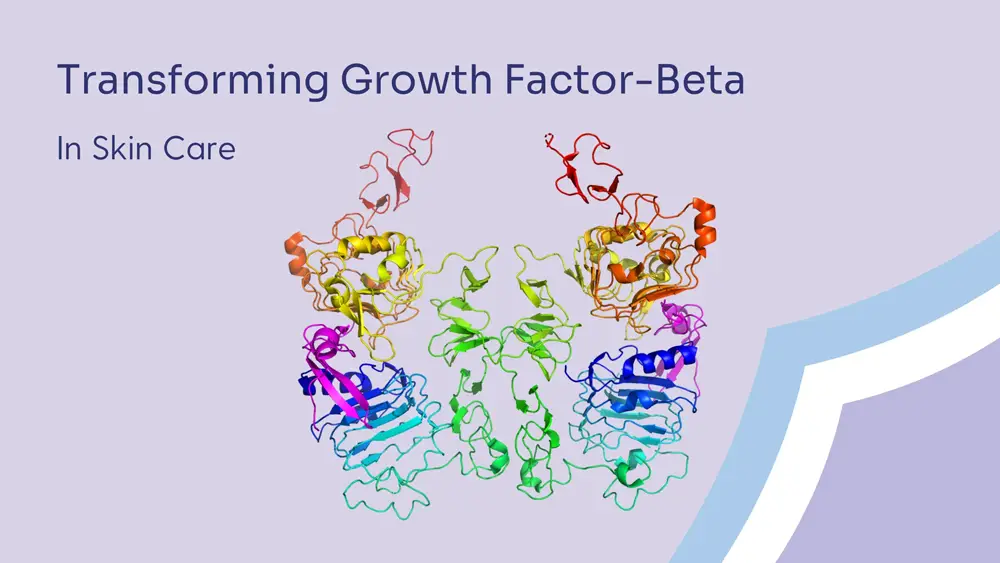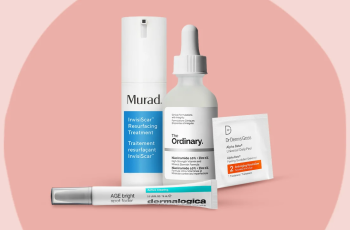
Transforming Growth factor beta (TGF-beta) in Skin Serums
Transforming growth factor beta, most commonly known as TGF-beta or TGF-β, is an important growth factor found in antiaging serums. TGF-beta in skin increases collagen production, so it is found in many antiaging serums. However, growth factors in skin care products can be unstable and may not penetrate into the skin. (1) So- are TGF-β serums worth the money? Maybe and maybe not.
There are so many antiaging skin serums with antiaging ingredients. How do you know which is best?
The only scientific way to find the best growth factor or antiaging serum for you is to shop by your Baumann Skin Type.
What is TGF-β?
TGF-beta is the most important growth factor that regulates production of the extracellular matrix (ECM) proteins such as collagen, and elastin and the glycosaminoglycan sugars in the skin such as hyaluronic acid and heparan sulfate.
There are a few types of TGF-beta.
TGF-β1 is the type found in skin care products ad used as a treatment for skin rejuvenation, antiaging, and wound healing.(2)
TGF-beta in Skin
Transforming Growth Factor Beta (TGF-beta) is a multifunctional cytokine belonging to the transforming growth factor superfamily. These proteins play critical roles in the regulation of various cellular processes, including cell proliferation, differentiation, migration, and apoptosis. In mammals, the TGF-beta family is composed of several isoforms, such as TGF-beta1, TGF-beta2, and TGF-beta3, all of which are synthesized as precursor proteins and later become activated through a complex maturation process. TGF-beta acts as a potent regulator of many aspects of immune function, wound healing, and tissue regeneration, and it plays a key role in the development and homeostasis of several tissues.
What natural TGF-beta does in skin
In the context of skin health, TGF-beta plays a vital role in maintaining skin integrity and healing. It promotes the synthesis of extracellular matrix components, including collagen, elastin, and fibronectin, which are crucial for skin strength and elasticity. During wound healing, TGF-beta is essential in the regulation of inflammation and the recruitment of cells to the injury site, where it aids in tissue repair and scar formation. Additionally, it helps to regulate the balance of cell proliferation and differentiation in the skin, ensuring that the skin maintains its normal structure and function.
Dysregulation of TGF-beta signaling has been implicated in various skin conditions, including scarring, fibrosis, and certain inflammatory disorders.
How TGF-beta Increases Skin Collagen
Transforming growth factor beta (TGF-β) is a superstar when it comes to collagen production in the skin. This powerful protein regulates cell growth, proliferation, and differentiation, making it a key player in wound healing and skin rejuvenation.
When TGF-beta binds to receptors on fibroblast cells in the dermis, it kicks off a signaling cascade that ultimately ramps up collagen synthesis. Studies show that TGF-beta stimulates fibroblasts to produce more collagen types I and III, the predominant structural collagens that make up over 90% of the dermal matrix.
TGF-beta also inhibits collagen breakdown by blocking matrix metalloproteinases.
In addition, TGF-beta attracts immune cells called macrophages to wound sites, where they secrete more TGF-β to further drive collagen accumulation. This cytokine can even induce fibroblasts to transform into activated myofibroblasts, which synthesize abundant collagen during skin repair.
TGF-β Skin Benefits
TGF-β has many skin benefits because it turns on processes in the skin that make it stronger and younger. It affects many processes that play a role in skin aging. For this reason, good TGF-b products can improve fine lines and skin texture.
This antiaging growth factor:
stimulates dermal collagen remodeling increases the production of collagen,(1)
increases production of hyaluronic acid (4)
decreases matrix metalloproteinases (5) that break down these important skin components.
How does TGF-beta Work?
When the TGF-β receptor is activated, the TGF-β/Smad pathway is turned on. This important pathway helps rejuvenate skin.
Do TGF-beta serums really work
TGF-beta is applied topically to skin as a serum, cream, or lotion that is designed to be absorbed into the skin. The TGF-b molecule itself is relatively large, making its penetration through the outermost layer of the skin (the stratum corneum) somewhat challenging. To enhance its penetration, it is often encapsulated in liposomes or other delivery systems that allow it to reach the deeper layers of the skin where it can exert its effects.
The efficacy of topical TGF-beta skin products can vary, depending on the formulation and the individual’s skin type. Research on the effectiveness of topically applied TGF-beta is ongoing, but some studies suggest that it can have beneficial effects on skin appearance, including reducing the appearance of wrinkles and improving skin texture and tone, presumably by stimulating collagen production and other skin-renewing processes. However, not all formulations may be effective.
Skin care products with TGF-beta
The brand with the best TGF-B in skin care is Plated SkinScience. Their revolutionary use of cutting-edge anti-aging technology makes them one of the best brands on the market today! These are my favorite Plated SkinScience Products:
What is the link between TGF-β and skin aging?
UV radiation inhibits the TGF-β/Smad pathway. in a process called extrinsic aging. Blocking the TGF-β/Smad pathways contributes to photoaging, wrinkled skin, and the development of skin cancer.(6)
How can you increase levels of Transforming growth factor beta in skin
Besides applying TGF-b in skin serums, there are other ways to coerce fibroblasts to secrete more TGF-β.
17β-estradiol increases TGF-β production (7)
Topically applied retinoids increase TGF-β/Smad pathway activity.(8)
Fibroblasts that are in hypoxic conditions produce more TGF-β.(9)
This is another reason I love retinoids to treat wrinkled skin.
Is TGF-β safe to use on skin?
TGF-β seems safe to use on skin; in fact, a decrease in TGF-β may predispose skin to cancer, but much more data is needed.(10,11)


